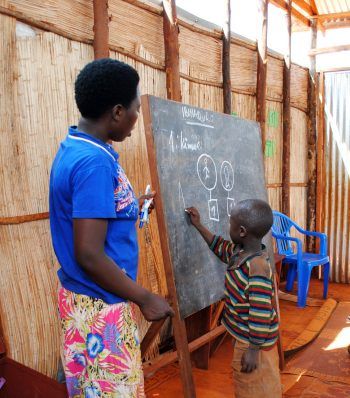
Plan International grew out of an emergency situation: the Spanish Civil War in 1937. Since then, we’ve always put children at the centre of all that we do. We are well known for child sponsorship and our donors know that their support uplifts communities, not just individual children. But our humanitarian assistance work is not as well-known and on World Humanitarian Day we’d like to provide some insights on how we approach this work.
Plan International Canada has been doing humanitarian assistance work since 2007 and it continues to be our fastest growing program. Our goal was never to compete with organizations who are experts in this field because the core of our work is development.
Plan International Canada does most of its work 30 days after an emergency. When there is a rapid onset crisis, one of our staff is deployed to the effected country. We work with our local office and UN agencies to focus on education, child protection, training and more to help with the recovery and transitional phase once immediate needs are met. We are uniquely positioned to implement programming in partnership with local experts as we work in over 70 countries. After the emergency aid is delivered and put into place, we work to ensure that children continue to be considered and protected.
As an organization, we aim to be gender transformative * in our programming. However, because our humanitarian assistance projects are short term, they are currently classified as gender-aware *. In order to be transformative, we must remain in the community for a longer time but gender is always a consideration for our work. No project is approved and we are not on the ground until our in-house gender experts have given it the green light.
The word “aid” is limited. The work we do goes beyond aid. We take an integrated approach to humanitarian assistance and this assistance implies continuity in our support. Aid focusses on a moment in time but assistance considers rebuilding lives and empowerment to be a process. We want communities to thrive again. Our programming is led by our country office with local experts and is designed to keep the dignity of community members while helping them become more resilient.
There are two key areas that the sector needs to improve in order for humanitarian assistance to succeed in the future:
Accountability – Many organizations have been providing aid for a long time but moving forward, we need to zero in on accountability and assess effectiveness. We owe it to the people who support us and the ones who are counting on us to make sure we are providing sustainable solutions in the field.
Gender – Considering gender when deploying staff or implementing programs is critical. There are different risks and challenges experienced by people based on their gender identity. Taking these into account will increase the impact of our work and value as a sector.
Let’s mark World Humanitarian Day by celebrating the work we’ve done over the years and all the families we have helped but continue to push ourselves to do better.
Publié:
août 19, 2019
Auteur:
Plan International Canada
Catégories:
Partager cette publication: